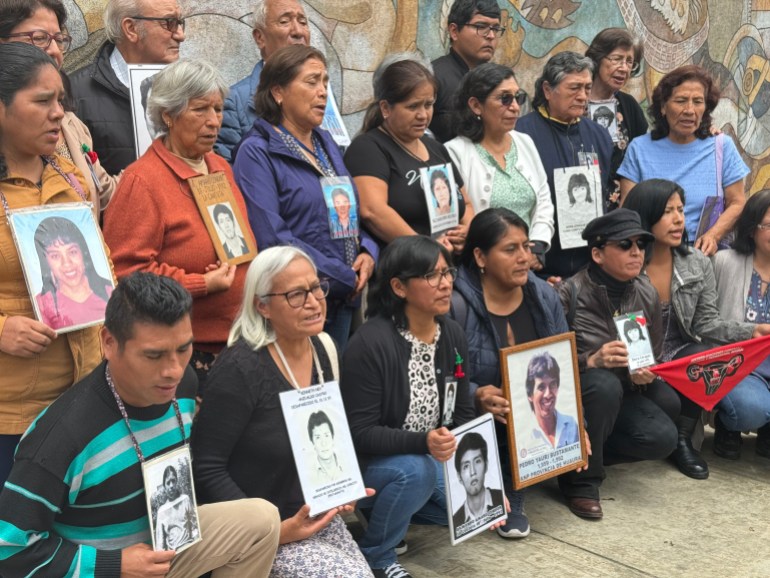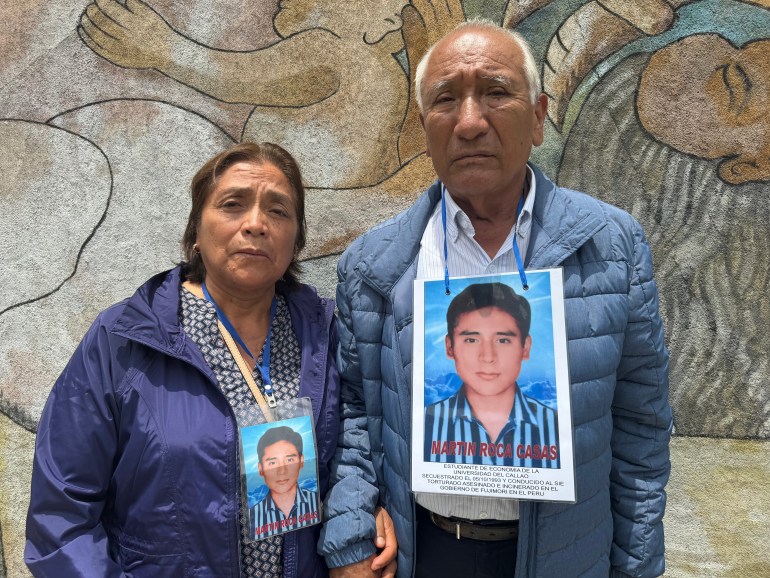He was horrible at math. Loved to play sports. And always seemed to be smiling. When Gisela Ortiz thinks back to her older brother Luis Enrique, she remembers someone who was kind and generous, willing to lend clothes out of his own closet to classmates in need.
But when Ortiz was 20, her brother disappeared. She later learned that soldiers had burst into the university residence hall where he was staying and abducted him, along with eight other students.
Together with a professor, they were taken into a field and executed, their bodies dumped in a mass grave. Luis Enrique was only 21 years old.
Now, more than three decades later, the person Ortiz holds responsible has been released from prison — and Ortiz is among those raising their voices in protest.
On December 6, former Peruvian President Alberto Fujimori was freed, 16 years into a 25-year sentence.
In 2009, he had been convicted of ordering massacres between 1991 and 1992 that claimed the lives of 25 people, including Luis Enrique.
But critics have said that his record of human rights abuses stretches much further, to include allegations of torture, forced sterilisation and forced disappearances. The Inter-American Court had ordered Peruvian authorities to refrain from releasing Fujimori, given the severity of his crimes.
“A regime of impunity has been established,” Ortiz said after Fujimori’s release. “Ignoring the ruling of the Inter-American Court really makes us a country that does not respect human rights at the international level, and that is a step that is difficult to reverse.”

Peru is a member of the Inter-American Commission on Human Rights and is legally bound by the decisions of the Inter-American Court.
But Fujimori has remained a towering figure in Peru’s conservative politics, with a broad base of popular support. Proponents credit him with stabilising the economy, combatting armed leftist groups and launching infrastructure projects that improved transportation, education and healthcare.
The former president was first granted a humanitarian pardon in 2017, though it was later nullified. Peru’s Constitutional Court reinstated the pardon this month, partially on the basis of Fujimori’s advanced age and poor health.
Still, César Muñoz, the Americas associate director at Human Rights Watch, told Al Jazeera that Fujimori’s release is an “extremely serious setback” for rule of law, not to mention for those harmed.
“It’s a slap in the face to the victims,” Muñoz said.
He explained that, according to international law, humanitarian pardons may indeed be granted to human rights abusers, but two conditions must first be met.
The first condition requires countries to punish human rights abusers according to a consistent standard, without discrimination or favour.
“You cannot have rules that change depending on who the person is,” said Muñoz.
The second condition requires that medical professionals render an independent, thorough and impartial determination about the need for a humanitarian release.
“Those two elements were not there” in the case of Fujimori’s pardon, Muñoz explained.

Following Fujimori’s release, the Inter-American Commission on Human Rights said it “rejects Peru’s decision” and called for the country “to take effective measures to guarantee the victims’ right to access justice”.
Cameras last week captured Fujimori, 85, stepping out of the prison gates and into the arms of his two children, Kenji Fujimori and Keiko Fujimori, both influential politicians.
The news left Javier Roca Obregón, also 85, feeling “indignant”. He has long since lost hope of ever seeing his son, Martin Roca Casas, again.
“I am 85 years old, and I have no hope,” Obregón told Al Jazeera. “I just want to die soon.”
In 1993, Casas was a student at the National University of Callao when he was tortured and detained by Peruvian military forces. His body has never been recovered.
Obregón and others believe Casas’s abduction was linked to his student activism. He remembers his son as a beacon of hope for other young people — “an example of overcoming” life’s obstacles.
Shortly before he went missing, Casas participated in a march against a tuition increase at his university. When two people started to film the protest, he and other students grabbed the camera and destroyed it — an act Obregón suspects precipitated his kidnapping.
“In Peru, the life of a poor person is worth nothing. The poor have no right to justice,” said Obregón, who originally hailed from the small, rural town of Yanama. “Just like a dog, they can kill it and then forget about it. That is what is being repeated.”

Critics have said Fujimori governed with relative impunity during his term in office, from 1990 to 2000. His presidency oversaw the dissolution of Congress and the suspension of Peru’s constitution, allowing him to consolidate power.
Carolina Oyague said it was a “terrible” feeling to see the video of a smiling Fujimori being released to his children.
Her older sister Dora, 21, was one of the nine students abducted from the Enrique Guzmán y Valle National University of Education in 1993, alongside Luis Enrique Ortiz.
Oyague remembers her sister as “cheerful and creative”, a budding entrepreneur who sold everything from makeup to cakes to pay for her education.
It was not until September of this year that parts of Dora’s skeletal remains were recovered and presented to her family. To watch Fujimori walk free only a few months later left Oyague furious.
“There’s no mea culpa,” she said. “He doesn’t even have a modicum of remorse.”
Fujimori has issued vague apologies in the past but has never taken direct responsibility for the military killings or the other abuses that occurred under his administration.
If anything, Fujimori’s governing style and ideology — nicknamed “Fujimorismo” — has remained a dominant political force in Peru. His daughter Keiko was one of the leading candidates in the 2021 presidential election, as part of the conservative Fuerza Popular party.

Inés Condori, president of the Association of Women Affected by Forced Sterilization of Chumbivilcas, was among the more than 200,000 Peruvians sterilised without their consent between 1996 and 2000, in what Fujimori’s government sought to portray as an anti-poverty measure.
Many of the victims were Quechua-speaking Indigenous women from rural communities, a fact that has fuelled accusations of ethnic cleansing. Condori, too, considers Fujimori’s release a miscarriage of justice.
“We have been fighting for 25 years, but there is no justice for us, the poor,” Condori wrote to Al Jazeera on WhatsApp. “[Fujimori] needs to be in prison forever.”









